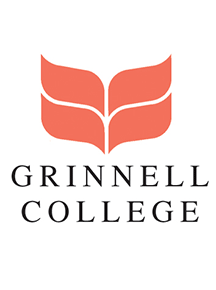By Lisa McDonald
In order to receive a charter for a chapter of Phi Beta Kappa, the college or university needs to promote achievements in the liberal arts and scientific fields. This is a requirement all 283 chapters are held to, and an area the chapter at Grinnell College has demonstrated its dedication exceptionally well in through the two annual awards at the college.
In 1908, Phi Beta Kappa installed its seventieth chapter at Grinnell, and the college has strived to recognize students who exemplify the Society’s goals through the Neil Klausner Sophomore Book Award and the Joseph Wall Phi Beta Kappa Scholar’s Award.
The Sophomore Book Award is given each fall to a maximum of three students who have achieved not only among the highest GPA of their peers in their first year at college but also demonstrated breadth of exploration in the variety of courses taken for their education. The award results in a cash prize to purchase textbooks at the college bookstore.
The Scholar’s Award is given each spring to one or two Grinnell students who have completed exceptional scholarly work prior to their last semester as a senior. The “scholarly work” submitted for review can consist of anything from scientific research papers to musical compositions, as long as it demonstrates tangible results in the respective fields of study. After all submissions are received by a specified date in February, the award is presented in April at the annual Phi Beta Kappa Convocation held on campus.
Associate Professor and Phi Beta Kappa Secretary Andrew Hamilton has been involved with the Grinnell chapter for the last twenty years and is one of the many people who help conduct the long process involved with selecting the Scholar’s Award winner.
After the usual ten to fifteen entries are received, Hamilton explained, they are sorted into their respective fields of study to be distributed to several different groups assigned with the task of determining the best one from each category. After the entries have been narrowed down an executive committee determines the final outcome, a task that can be a challenge for those on the board.
“Better to recognize two than pull our hair out determining the perfect one,” Hamilton said about the process. Attempting to determine the superiority of one piece of work over another when they are in completely contrasting fields isn’t an easy task, so recognizing two pieces instead of one results in a good compromise.
This is what happened last year when a history seminar paper and musical composition both received the award. At the convocation, last year’s Phi Beta Kappa chapter president, Professor Jonathan Andelson, introduced both of the winners, Margaret “Meg” Rudy and Daniel Ehrlich, with words of high praise.
Concerning Margaret Rudy’s history seminar paper “Performing, Practicing and Organizing Liberty: New York’s African Free Schools and the Black Activist Community, 1786-1832,” Andelson observed: “Extensively researched both in primary and secondary sources, effectively argued, and well-written, Ms. Rudy’s paper exemplifies the best in creative and critical historical scholarship.”
When recognizing Daniel Ehrlich’s original musical composition On Losing a Friend, Andelson shared the following statement from Jonathon Chenette, from former Grinnell music professor and current provost/academic dean at Vassar:
“An emotionally engaging contrast between the two movements, combined with a dramatic arc within each movement, coherent and exploratory musical vocabulary, jazzy syncopations, propulsive rhythms, and inventiveness in textures and tone colors add up to a score which demonstrates a mature and sophisticated musical creativity.”
For both students, receiving the award meant a lot. Rudy wrote her paper as her major research project for her senior seminar with the help of Professor Sarah Purcell, the person she says helped motivate and encourage her to produce the best paper possible.
“I hope other Grinnell professors use the ΦBK award to motivate students in the same way Sarah Purcell did—students deserve to be recognized for their hard work and the PBK is a great opportunity to highlight young scholars and their interests,” Rudy said.
For Ehrlich, his composition came about as the cumulation of his mentored summer project. “It was fantastic to get academic recognition for a piece of art, and I hope it can serve as a model that art making is worthwhile as an academic and personal pursuit,” he said.
After leaving Grinnell, both continue to be high achievers. Rudy is now teaching at a high school in Nanjing, China as part of a post-graduate fellowship program, and Ehrlich is working toward a Master’s of Music in Composition at the Royal Academy of Music in London, England.
This year’s winner will be announced at the convocation held April 29, continuing the excellence and dedication the Phi Beta Kappa chapter at Grinnell does well.
Lisa McDonald is a sophomore at Coe College majoring in physics and communication studies. Coe College is home to the Epsilon of Iowa Chapter of Phi Beta Kappa.




